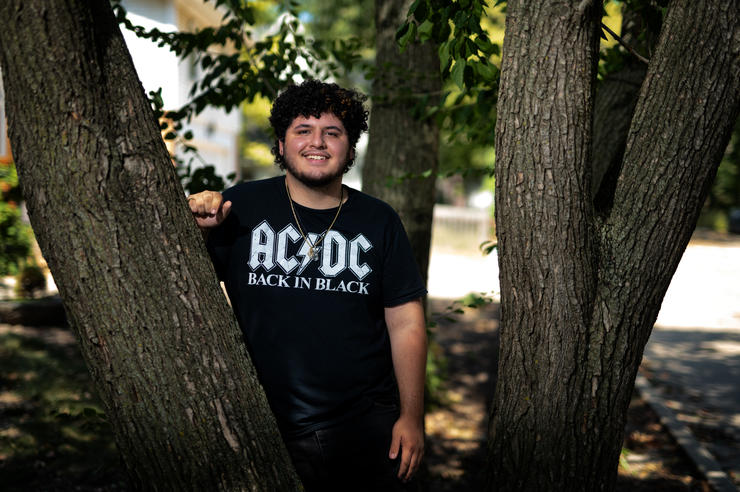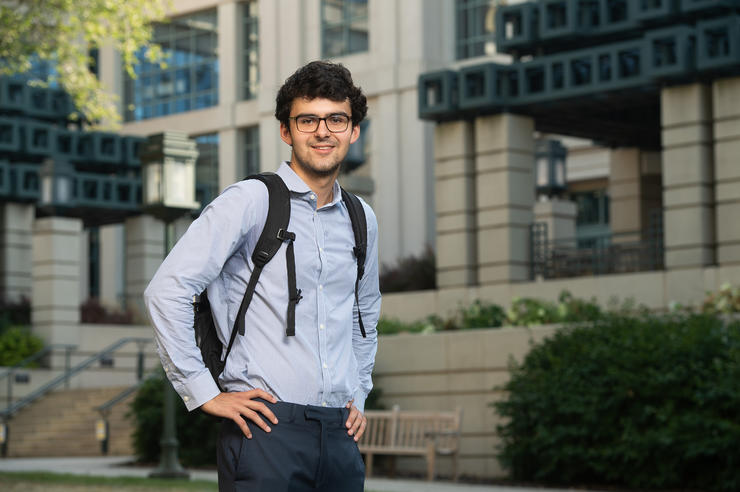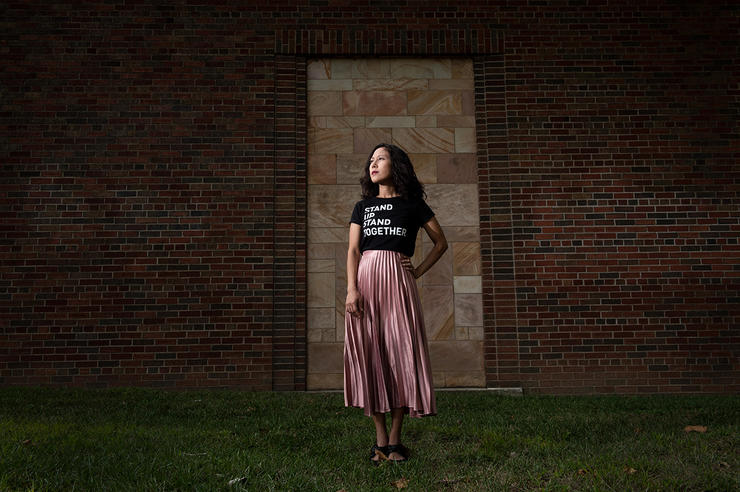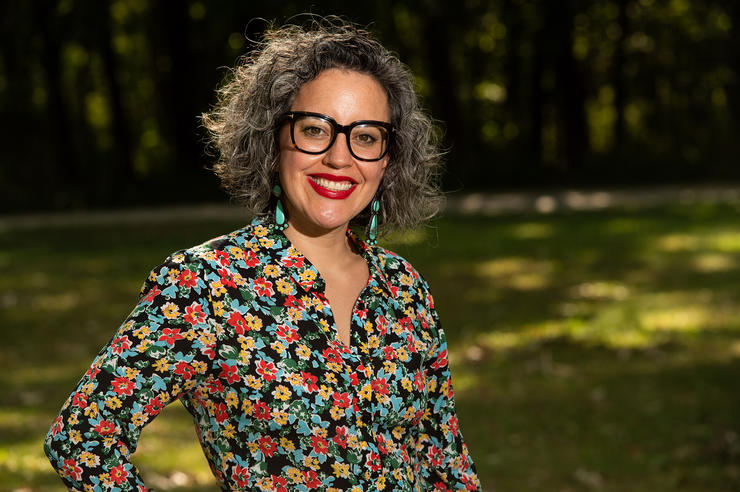Shining a light on the politics of immigration
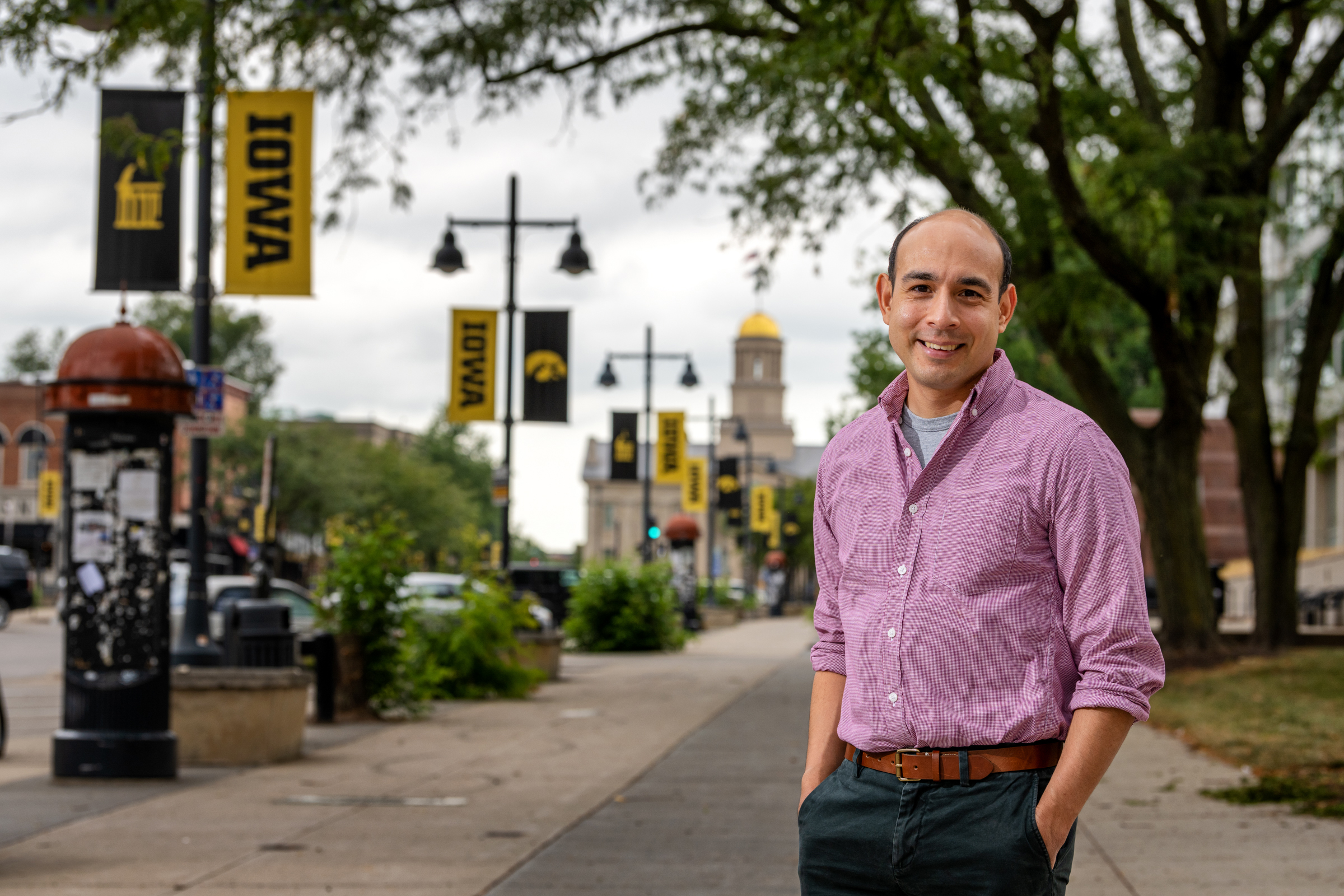
Rene Rocha grew up in McAllen, Texas, 10 miles from the United States/Mexico border. Immigration was omnipresent in his life. His mother is a first-generation immigrant from Mexico. He often saw people travel back and forth between the two countries.
Two years after Rocha moved to Iowa, U.S. Immigration and Customs Enforcement (ICE) raided a meatpacking plant in Postville, Iowa, arresting nearly 400 employees, many of whom were later deported. It wasn’t until then that the University of Iowa political science professor says he really thought about immigration and immigration enforcement in the interior of the country.
“That’s when my research arc and lived experience arc sort of intersected,” Rocha says.
“Growing up in the Lower Rio Grande Valley, there are things that you take for granted as being normal. But Postville was a real sort of awakening for me. I started trying to get my head around documenting what immigration enforcement looked like in the interior and understanding the effects of it. How does it affect people’s relationship with government and how active they become in politics? How does it affect where immigrants go? Does it deter immigrants from coming? What are the economic effects?”
Rocha attended undergraduate and graduate school in Texas, where his PhD dissertation examined racial and ethnic inequalities in the K–12 education system. After the 2008 Postville raid, Rocha refocused his research, since becoming a leading scholar of immigration politics and policy.
“For example, a (Latina/o/x Studies) student can learn about immigration from the perspective of a political scientist, from someone in American studies, or from someone who is looking at Latino popular culture or Latino literature. I’m very committed to (the program) being interdisciplinary and having strong representation across the humanities and social sciences.”
Arriving at Iowa as part of a Latino studies cluster hire, Rocha has spent much of his post-tenure energy building the Latina/o/x Studies Program, which began offering a minor in 2015.
“It’s been wonderful in terms of getting Latinx faculty together, understanding the connections between our work, and formulating a cohesive set of courses for students in which they get really complementary pieces of information from an interdisciplinary background,” Rocha says. “For example, a student can learn about immigration from the perspective of a political scientist, from someone in American studies, or from someone who is looking at Latino popular culture or Latino literature. I’m very committed to it being interdisciplinary and having strong representation across the humanities and social sciences.”
Student demand for the Latina/o/x Studies minor has grown steadily, with 65 students enrolled at the end of the 2020 academic year—near its cap based on the available number of classes and faculty. The goal is for the program to become a major.
“The program of course draws heavily from the Latinx student body, but we also get a lot of non-Latinx white students who grew up in areas with a heavy Latinx population and want to know more about and understand their neighbors,” Rocha says. “Even those students who aren’t from heavily Latinx communities are coming from a real place of curiosity and wanting to learn about this diverse community. I think that’s been a really valuable service that the program has been able to off the university.”
The Latina/o/x Studies Program, and the work of Iowa faculty and students within the area, received broader national attention through last year’s Sawyer Seminar, Imagining Latinidades: Articulations of National Belonging, a yearlong project of the Latina/o/x Studies Program, the Obermann Center for Advanced Studies, and the Andrew W. Mellon Foundation.
Latina/o/x Studies offers an interdisciplinary perspective on the history, culture, politics, and experiences of Latina/o/xs in the United States. The Latina/o/x Studies minor helps to prepare undergraduates for careers in medicine, public health, social work, business, education, and the arts, and to respond to the changing demographics of the U.S.
“It marked Iowa as a place where Latinx studies exist and is growing,” Rocha says. “It provided accessible programming for faculty and students, and we were pleased to see so many Iowa City residents show up, ask questions, and get engaged. That sort of community engagement was an important piece of what we were doing.”
With Latinx/a/o Heritage Month in full swing, Rocha says he enjoys that the accompanying events highlight the Latino/a/x community on campus. But he also reminds people that just because the community may be more visible at this time of year, it’s not new.
“The population in the state is growing, and on the one hand that can lead to the belief that the population is new,” Rocha says. “You don’t want to forget that there are people who have been around for a much longer period of time. This month serves as a reminder that we have been around for many, many years, even if there are more of us now.”
In 2018, Iowa added a General Education CLAS Core requirement of Diversity and Inclusion. In response, Rocha developed the course Introduction to the Politics of Race. He says one goal of the course is to introduce the concept of institutional or systemic racism, which increasingly has received wider attention over the last few years and particularly during Black Lives Matter protests this past spring and summer that aimed to call out continued disproportionate police brutality against people of color and a lack of racial equity and justice across the country.
“One of the promising developments that have come out of the BLM movement is that we can begin to put the concept of institutional racism on the table and discuss it,” Rocha says. “In the past, I found students tend to be open to the idea, but it’s often very revelatory to them. It’s this sort of blindness to the idea of the multiple ways in which you have cumulative disadvantage that builds over decades and permeates every facet of American life. They are sort of shellshocked by the end of the course sometimes.
“One of the challenges of the moment is to really keep that focus prime and to not allow our understanding of racism to be confined to private prejudice. Private prejudice is real and people experience it, but we can’t only understand racism through that narrow definition.”
Rocha says he hopes this historic moment will provide energy for the university and community to recommit to goals of diversity, equity, and inclusion and provide appropriate resources to achieve them.
“The thing I love about Iowa is it’s a place where I can really be a teacher/scholar. I love both of those missions.”
“I think the past couple of years have produced a range of uncomfortableness to fear, depending on a person’s vulnerability or person’s ties to individuals who are vulnerable,” Rocha says. “It’s everything from, ‘I’m worried about the well-being of myself to that of my friends or family.’ When people put a ‘Build the wall’ poster on campus, it makes me feel unwelcome and like they don’t think I belong here. That sort of intolerance is not new. It persisted through the Obama years and in the Trump years, but there’s been a greater rhetorical polarization within the past few years. And that rhetorical polarization has real consequences.”
While Rocha initially was more interested in teaching, he discovered a love for research as well, and now enjoys being able to combine the two passions.
“When I was an undergrad, I just thought my profs had the coolest job in the world,” Rocha says. “They got to show up and have interesting conversations every day. And I thought to myself, ‘I want to do that.’ In grad school, I found myself enjoying and being adept at research. The thing I love about Iowa is it’s a place where I can really be a teacher/scholar. I love both of those missions. I love going into the undergraduate classroom pretty much every day. Even if it’s the 10th time I’ve taught a class, it’s different. The students are different, their experiences are different, the questions are different. It’s the same book, but it’s a different conversation each time. And I love it.”
And Rocha says even though he still doesn’t like Iowa winters, he loves his adopted hometown.
“I’ve enjoyed getting to understand this different piece of America,” Rocha says. “I grew up in a place that was over 80% Mexican or Mexican American. This was my first experience living in a state that is 90% white. But that is the case in a huge swath of the U.S. I fell in love with Iowa City immediately.”
